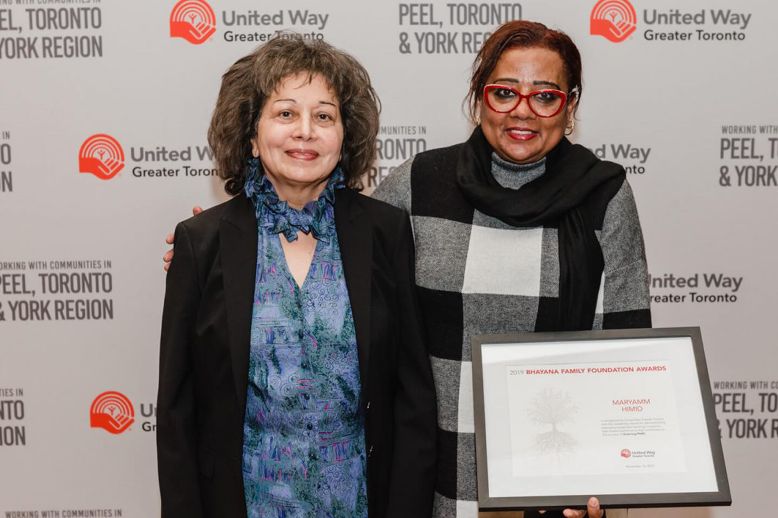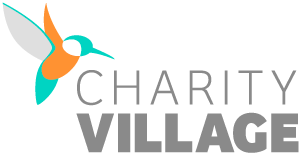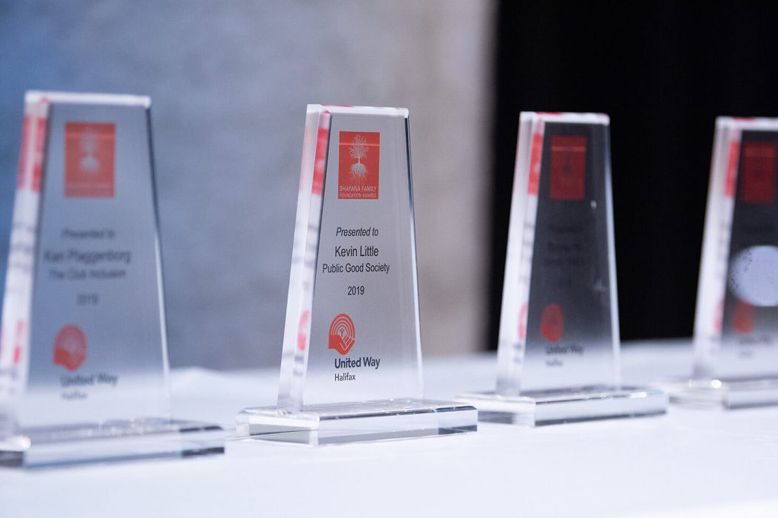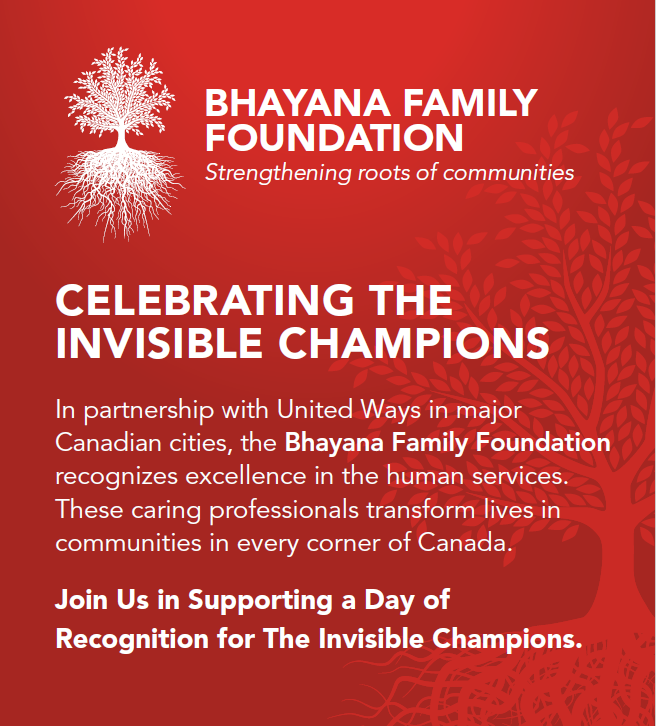They come from all walks of life and different parts of the world. They carry with them a rich tapestry of personal experiences and they all pursue the same goal: to improve the lives of the people in their community, especially the vulnerable and the marginalized.
They’re social services professionals, whose unfailing dedication has transformed lives.
More than a decade ago, a couple launched a family foundation expressly to thank those they call “invisible champions”.
When Raksha Manaktala Bhayana came to Canada from New Delhi, her first career was as a therapist working with children who had serious difficulties at school, at home and in the community. It was a pressure-filled job and came with an enormous cost.

“The kind of pressure we faced and the toll it took, it was like a pounding of your emotions,” says Manaktala Bhayana. But people outside the field had no idea, she says.
It was these early experiences that planted the seed for what eventually became the Bhayana Family Foundation, supported for several years by RBC Wealth Management. The foundation’s mission, in partnership with The United Way across Canada, is to recognize excellence in the non-profit social services sector and to celebrate the leaders and front-line workers, without whom many essential community programs would not be possible.
Founded in 2006, nearly 1,000 dedicated social service professionals have been recognized to date for their leadership and innovation. Awards are given in every other career field, Manaktala Bhayana says, but front-line, professional social service workers go unrecognized.
“They go above and beyond almost everyday. When some of these people get recognized, they cry because it’s never happened before,” says Manaktala Bhayana, who hopes to expand her program and eventually create a national day of recognition for the sector.
From coast to coast, professionals like Bev Candham, Maryamm Himid, and Kimberly Barwich are being recognized for their decades of tireless work.
We share their stories below.
“Sometimes I just need a reprieve”
Bev Candham, the co-executive director of the Halifax/Dartmouth Canadian Mental Health Association (CMHA), was humbled and honoured by the Foundation’s recognition and says her son Shaymus is her guiding light.
“The award itself is about community. There’s not a whole lot of awards focused on this and the significant impact that has,” she says.
The centre provides social support programs for marginalized adults, many of whom live with mental health challenges. At the centre, they have access to a wide variety of services such as food and security assistance, transportation, and housing needs. Experts are also brought in to discuss a variety of issues, including the side effects of medication, transgender issues, and Alzheimer’s.
But keeping the program alive while running a non-profit day-to-day is not easy. Candham is one of only two full-time staffers who must also fundraise some 40 percent of the organization’s budget. And the search for new money never ends. Most grants are finite, earmarked for specific program uses that do not go towards operation costs, and have expiry dates. This often means when the grant is done, so is the program it supported.
Every area in mental health and addiction is underfunded, says Candham.
In addition, there’s a huge wait list for psychiatrists and getting into the formal health system, she adds.
It’s an issue highlighted in a report by the Globe and Mail, which found half of all Canadians live in areas where the number of psychiatrists per person falls below the recommended ratio from the Canadian Psychiatric Association. Another 2.3 million Canadians have no permanent psychiatrists at all.
“Often times it’s in crisis mode that people end up getting the services they need that they did not get on a regular basis,” she says.
Candham understands first hand how important access to help is. Her son Shaymus Candham-Higgins took his own life in 2017.
Shaymus had learning challenges, which appeared at a very early age. They were accompanied by severe anxiety, which worsened with age, and ADHD that was undiagnosed until much later in his life. He was a diligent worker, Candham says, but school could be daunting at times. Still, with a lot of advocating from the “amazing” faculty at the Nova Scotia Community College and many support systems in place, he graduated.
Shaymus received some counselling, but despite best efforts, he didn’t always go. They tried to get him help through the formal healthcare system, but he remained on the waitlist.
When Candham asked him why he was dabbling with drugs, he replied: “It turns my head off for a while, so it’s not constantly in a state of go, go, go. Sometimes I just need a reprieve.”
There came a day, however, when he’d had enough. “He took a moment where I think he just didn’t want to fight anymore. It was just too exhausting,” Candham says.
Today, one of Candham’s missions is to raise awareness and send a message that nobody should suffer alone. She’s taking the $1,000 award money she received from the Bhayana Foundation to start a scholarship in her son’s honour.
The scholarship will be specifically for youths like Shaymus, who grapple with mental health challenges but also want to go back to school. Recipients would use the money toward services they need to help them with any emotional and academic challenges, such as counselling or life coach support.
“He is guiding me from a different dimension now,” Candham says.
“We share their pains and their joys”
Some 1,800 km west, in Toronto, Maryamm Himid is another recipient of a Bhayana Foundation leadership award. She coordinates a Community Access Program at Sistering/PARC, where she and a small team work with refugees, newcomers, the homeless, and others – many of whom are also socially isolated or in poor health. They come from as far away as Tibet, South Asia, and as close to home as nearby indigenous communities, Himid says.
Staff members take them to mental health appointments and pharmacy visits, and accompany them to open bank accounts. They connect people with food banks and outreach programs and often spend their own money to help clients.
There are many things people don’t know how to navigate, especially if they’re newcomers, says Himid. When patients go alone, they might also face prejudices and harassment, she adds. Helping participants overcome barriers within the system is a core function of Himid’s team.
In 2018, the program helped 1,165 participants. But with only half a dozen staff members, the work is beyond challenging.
“Our workers don’t just accompany people, but we also follow up and visit when possible. We bring coffee, tea, sit down, talk with them,” says Himid. And they’ll sometimes bring clothes or a jacket when it is cold, for example. These are the details her team notices, says Himid, because they spend so much time with participants.
“We work with people who’ve gone through so much. We share their pains and their joys.”
The power of people can lift a whole community
Kimberly Barwich fell into social service work by chance when an opportunity with kids in a junior leadership program opened up in her 20s. She was amazed at how much she enjoyed the work, and says it changed the trajectory of her career toward “doing something meaningful.”
For 20 years, Barwich has been building a community, program by program, in Burnaby, British Columbia. Hired as Burnaby Neighbourhood House’s only staff member, Barwich has turned the organization into a large community hub with full- and part-time staff of 110 and some 800 volunteers.
Under Barwich’s leadership, it offers programs including afterschool and family resource programs, nine childcare centres, a literacy and numeracy program, youth leadership, senior outreach programs, and community kitchens.
“Our mission is to make our neighbourhoods better places to live and work through the power of people. It’s very much about the community coming together, seeing what the needs are, and giving back,” says Barwich, a winner of the foundation’s Leadership Award.
Watching the volunteers find a place where they can give back is “amazing” she says.
But none of this would be possible without Barwich and her team’s constant efforts to find funding and sponsors. “It’s hard to have to justify the work all the time and prove it’s important,” she says. “Our social safety net is not strong enough, wide enough and not complete enough.”
For Barwich, partnerships with sponsors and other organizations are essential to their work. “We can’t do it without each other,” she says.
It’s also why recognizing the work being done within the sector is so important to Manaktala Bhayana: “What they provide is value beyond money,” she says. “They help people transform their lives. That’s their whole raison d’être.”
This article was originally published by RBC Wealth Management and is republished with permission. View the original article here.













